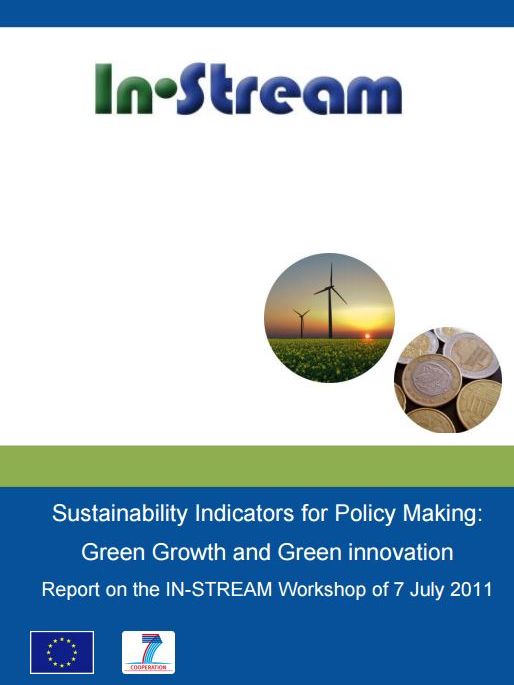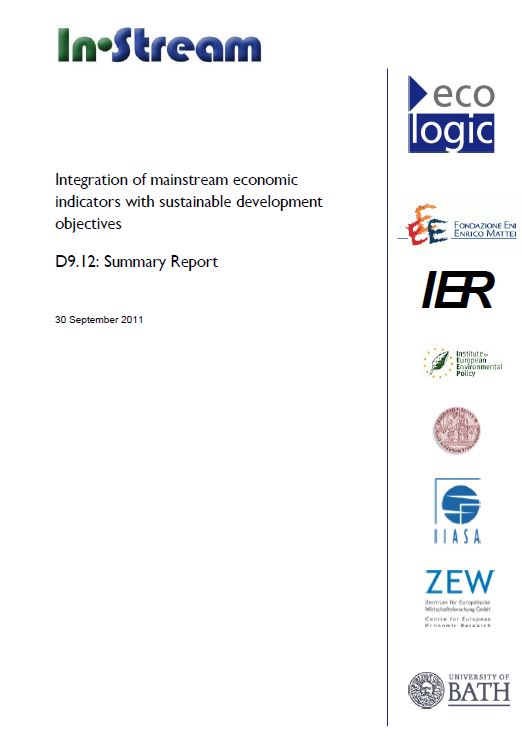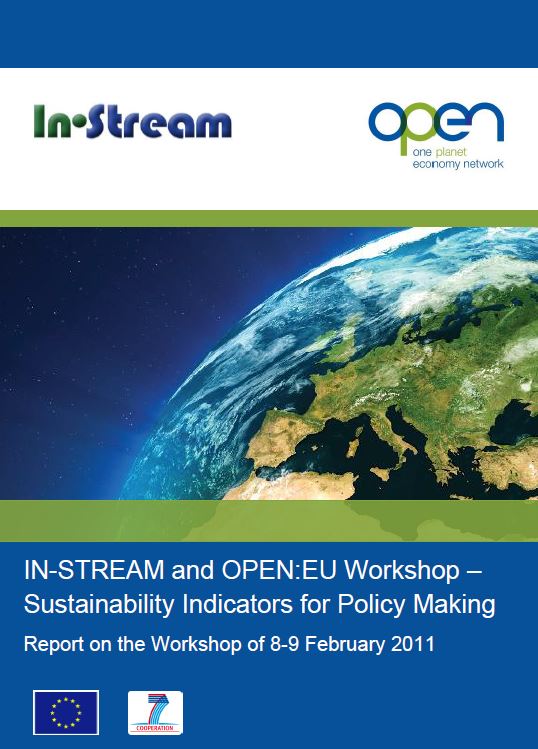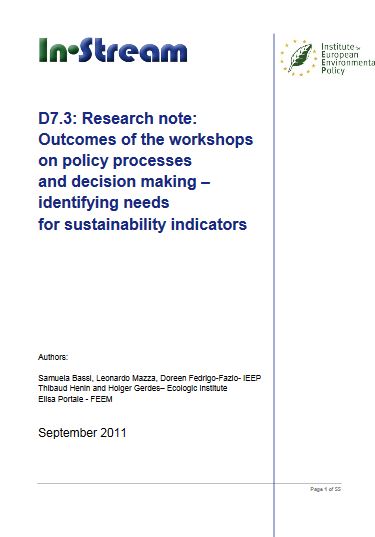Beyond GDP: Linking Mainstream Economic Indicators with Sustainability Measures - Final Conference of IN-STREAM
- Event
- Date
-
-
- Location
- Brussels, Belgium
Ecologic Institute organized the final conference of IN-STREAM from the 27 to 28th of September in Brussels. The conference summarized the research results of IN-STREAM and provided a forum for an intensive discussion with other parties involved in the Beyond GDP process, such as the European Environment Agency, the European Commission, the OECD, UNEP and the Global Footprint Network. The discussion covered a wide range of topics regarding how sustainability can be measured and produced important results on how to identify and quantify trade-offs between different dimensions of sustainability.
IN-STREAM aims at linking mainstream economic indicators with sustainability measures and is a FP7 project funded by DG Research. The Ecologic Institute leads the research consortium of 8 research institutions from 5 European countries. The conference focused on the policy applications of the research results and was structured in six sessions:
- Introductory Session
- Composite indicators and their role in policy making
- Green Growth and Innovation
- Trade-offs in policies affecting different dimensions of sustainability
- Biodiversity and Ecosystem Services
- Beyond IN STREAM – Further Work.
After an introduction into the Beyond GDP agenda by R. Andreas Kraemer, the Director of the Ecologic Institute, Olivia Chassais from the DG Research of the European Commission, focused on the role of the Beyond GDP process and the IN STREAM project in particular in the work of DG Research. Lucas Porsch from the Ecologic institute outlined the importance of indicators in the policy making process and pointed out on the example of the Europe 2020 strategy how statistical analysis and other work conducted in IN-STREAM can inform policy making aiming at sustainability.
Composite indicators can be an important tool in communicating complex messages to the general public, concluded Francesco Bosello from FEEM in his presentation on the FEEM sustainability index. Francesco pointed out that composite indicators can never be fully objective but that this subjective decisions can be an additional information for policy makers as it makes value judgements explicit. Oliver Zwirner from the European Commission services (DG Environment) explained the challenges of composite indicator development on the example of the Environmental pressure Index. The European Commission is aiming at producing a composite index that summarizes all human pressure on the environment in one index.
The following session focused on green growth and green innovation and was chaired by Paul Schreyer from the OECD. Paul Schreyer opened up with a brief introduction into the green growth strategy of the OECD. After that Victoria Alexeeva-Talebi from the Centre for European Economic Research (ZEW) explained the concept of economic competitiveness of sectors and nations and pointed out the results of modelling work which tested the impact of climate action on the competitiveness of energy extensive industries in Europe. Following this specific example of trade offs in sustainability policy making, Paul Ekins gave a broad overview on the questions of sustainability and growth and their interrelations. He especially pointed out that for a useful discussion on sustainable growth is crucial to define which type of growth is meant, distinguishing between physical growth (resource or material use), economic growth and growth in human welfare. Whether sustainability and growth do exclude each other depends on the definition of growth. Derek Eaton from UNEP concluded the session with an overview on UNEP’s perspective on the measurement of the transition to a green economy.
After the first day of the conference, all participants were invited by the Ecologic Institute to celebrate the 10th anniversary of the Ecologic Institute Brussels office which included a panel discussion with Paul Ekins, Christian Averous and Sebastian Winkler.
The second day of the conference started of with a session on trade offs in sustainability policy making. After an introduction into cohesion policy by Mathieu Fichter from DG REGIO of the European Commission, Milan Ščasný from the University of Prague analysed the impacts of emission reduction policies in the Czech republic on income distribution and which measures should be best used to express those impacts. Keti Medarova from the IEEP also analysed the inherent trade-offs of policy making in cohesion policy and the current developments in indicators to measure the different impacts of cohesion policy on the social, economic and environmental dimension of sustainability.
The next session was focused on indicators for biodiversity policy and was chaired by Patrick ten Brinck from IEEP. Rainer Friedrich from the University of Stuttgart explained the valuations of environmental damages that have been developed during IN-STREAM. By valuing the damages of climate change, the health impacts of air emissions or the damages to biodiversity policy makers gain a better information basis for deciding on the trade offs between the costs of a policy to reduce emissions and the benefits of the reduced emissions. Günther Fischer from IIASA analysed the impacts of international biofuel targets on Greenhouse gas emissions, prices of agricultural products and land use. The results gave some reason for caution as the modelling showed that a very quick increase in biofuel use could well increase Greenhouse gas emissions in the short term and have serious side effects on deforestation and the number of people at risk of hunger. The session was concluded by Sonja Gantioler from IEEP, who outlined the current development in international biodiversity policy and summarized the availability and robustness of the indicators in the policy area.
The conference was concluded by a session on the future research agenda in the field of Beyond GDP chaired by Gemma Cranston from the Global Footprint Network. Francesco Bosello from FEEM explained the main conclusions from IN-STREAM and the main areas where further work is needed. Additionally, Jean-Louis Weber from the EEA explained the current work of the EEA to build up a system of environmental accounts for the European Union. The conference ended with an intensive discussion on further research needs to make the measurement of sustainable development more accurate and more useful to policy makers.












